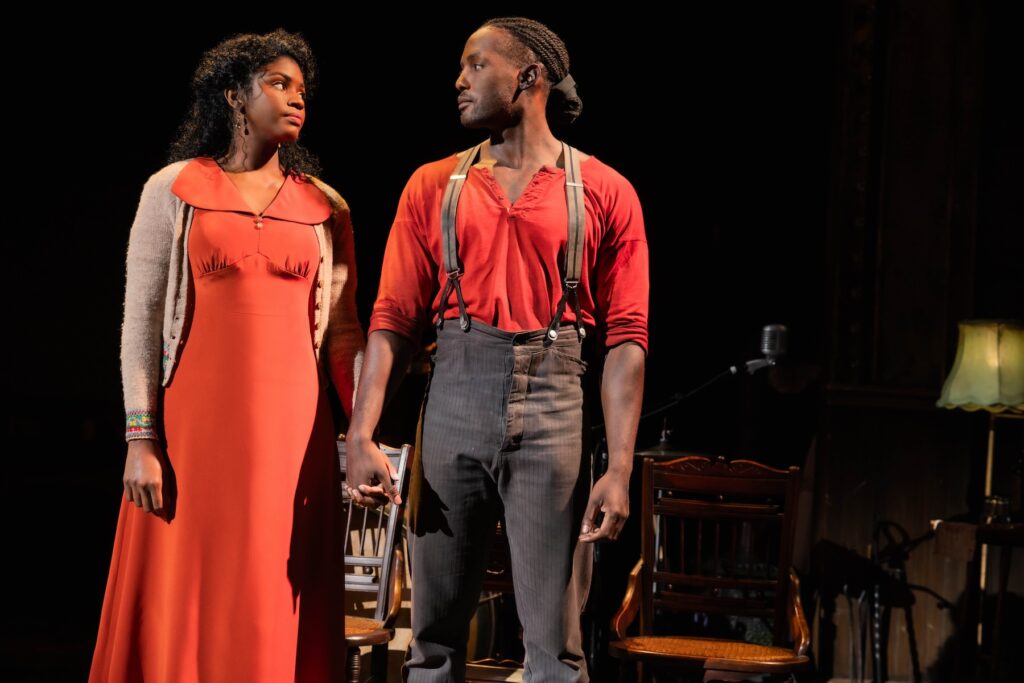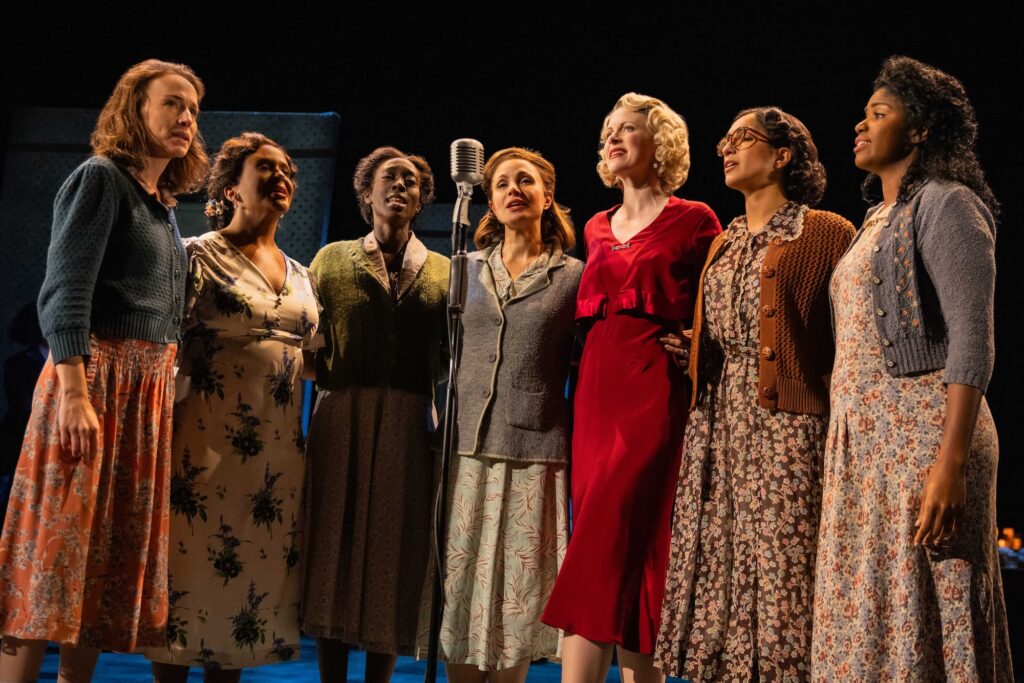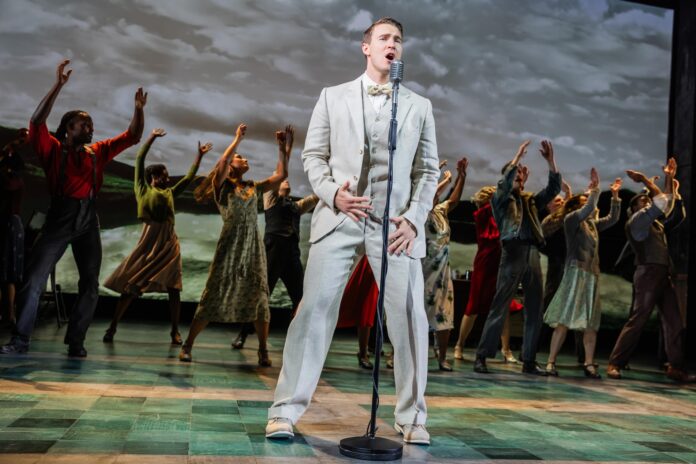Jukebox musicals are trickier than you’d think. Everyone’s listened to a playlist at one time or another—whether their own or just on the radio—and thought it formed a compelling narrative. (Hell, I see on my phone I’ve got about 42 playlists, most of them themed to holidays, break-ups, or just walking through the city at night.) But there’s a difference when a full concept album, narrative by design, is given a full production (Tommy, Sgt. Pepper’s) rather than trying to spin a narrative thread around a random roster of tracks.
Girl from the North Country (through August 18 at the Golden Gate Theatre, SF) tries to do the latter with the music of Bob Dylan, forgoing Dylan’s more cohesive, narrative-ish albums like Blood on the Tracks. Irish playwright-director Conor McPherson seems to have had some urge to tell a story about Dust Bowl-era US and probably had Zimmy playing in the background.
Folks like Sofia Coppola and Quentin Tarantino have built their careers out of infusing their period pieces with anachronistic needle-drops that enhance the stories rather than distract from them. McPherson has no such finesse, constantly stopping the story cold just to have a Dylan track performed with almost no context. Seriously, if you can tell me why “Hurricane” was used—its 1975 lyrics in-tact for this 1930s story—I’d love to hear it.
The story in question plops us into Duluth, Minnesota in 1934 in the days leading up to Thanksgiving. Our would-be narrator is the town doctor (Alan Ariano), who lets us know we’ll be watching the boarding house owned by Nick (John Schippa) and his delusional wife Elizabeth (Jennifer Blood). Elizabeth’s deteriorating mental state is likely why Nick makes no secret of his affair with the widow Neilsen (Carla Woods), a Black woman waiting on the inheritance from her late husband. Nick and Elizabeth have a biological son, aspiring writer Gene (Ben Biggers), and an adopted Black daughter, the pregnant Marianne (Sharaé Moultrie).

Also staying at the boarding house are motor-mouthed businessman Mr. Burke (David Benoit), his tense-yet-prim wife (Jill van Velzer), and their developmentally disabled son Elias (Aidan Wharton). Newly-arrived at the house are the boisterous “Reverend” Marlowe (Jeremy Webb) and his Black companion Joseph P. Scott (Matt Manuel). Also around is the lecherous Mr. Perry, a white man to whom Nick intends to marry off the pregnant Marrianne.
You’re probably wondering how the script balances the stories of more-than-a-dozen characters. It doesn’t. McPherson doesn’t even seem to try. Characters enter, dump exposition, then disappear before suddenly re-emerging to remind you that they existed. The doctor, who serves as both narrator and proper character, could be removed from both roles entirely and it would make no difference to the story. Gene is given one scene in which his girlfriend Kate (usually Chiara Trentalange, but played opening night by Ali Regan) informs him she’s leaving to marry another guy in Boston… and that’s that. Just another episode in seemingly-random series of them.
It’s as if McPherson went through a book of US theatre clichés and dumped every Tennessee Williams plot point into his script without cohesion. The paper-thin characters are all just people to whom things happen, all those things tragic.
It isn’t made any better an experience by having to watch such an uncommitted cast. Schiappa and Biggers, in particular, deliver every line with the monotone of theme park animatronics. Webb’s delivery sounds like a morning yawn. Overall, the cast—perhaps complacent from having performed so often on tour—are disconnected with any heart in their characters. They’re all fine singers and musicians (playing era-appropriate instruments placed around the mostly-blank stage; walls come in-and-out every now and then), but that just further emphasizes how poorly chosen are the songs.

Again, McPherson always stops the action cold to have the cast do a Dylan cover that’s barely related to the action (which you easily forget once the song is over). There are creative flourishes, like all the femme performers singing around a period microphone as if they were recording a radio jingle; the soundtrack for this would be fantastic to have on in the background, where it doesn’t monopolize one’s focus. But McPherson forces them into a story he didn’t flesh out, making everything clash uncomfortably.
What’s more, the Irish author tiptoes around ‘30s-era racism, almost ignoring it entirely. Perhaps Minnesota was better on integration than, say, Georgia at the time, but McPherson—who only pays lip service with Gene telling Joe to “get [his] Black ass up” and fight him—depicts both platonic and sexual interracial relationships in a manner that would raise more than a few eyebrows at the time, to say nothing of it getting several of these characters killed.
Not having been to a BroadwaySF show since at least 2019, COVID worries have kept me away the past 4½ years. Had I not recently acquired a Flo Mask, I wouldn’t have even considered attending this one. I was one of the few masked patrons of the not-full opening night crowd. Thankfully, the 102-year-old Golden Gate Theatre seems to have an effective HVAC system at play. I personally took note of the old-fashioned floor vents at my feet. Over the course of the two-act, 2½-hour show, my Aranet4’s CO² readings peaked around 907ppm, having dropped back down to 860ppm by the final bow.
Girl from the North Country is Dylan fandom gone awry. What was probably conceived as a touching tribute to the singer-songwriter comes off as a toothless Upton Sinclair knock-off with a genre-swapped ‘70s soundtrack. Time will tell how Dylan tributes like 2007’s I’m Not There and the upcoming A Complete Unknown stand up in hindsight. For right now, Conor McPherson’s entry into the Dylan fan canon is confused enough to almost be a tribute to the singer’s infamous mumbled speech.
GIRL FROM THE NORTH COUNTRY runs through the August 18 at the Golden Gate Theatre, SF. Tickets and further info here.







